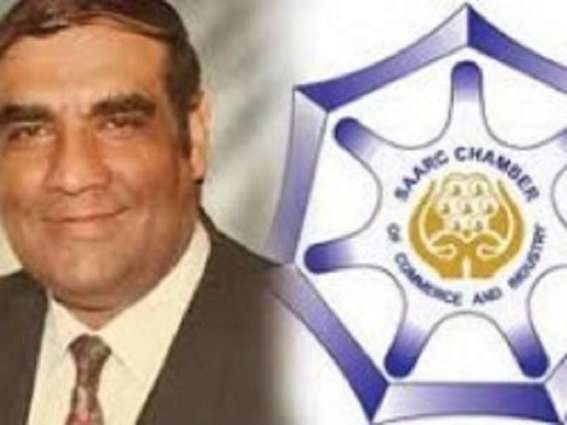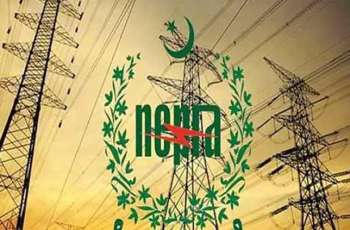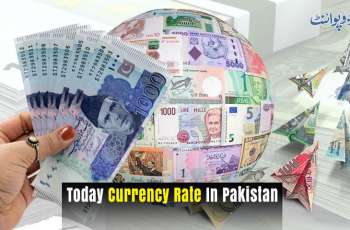President Elect Saarc Chamber Of Commerce And Industry Ruwan Edirisinghe Monday Stressed The Urgent Need For Strengthening Of Durable Collaboration Among The Saarc Member Countries To Boost The Trade And Investments Volume In The Region
Lahore: (Pakistan Point News - 26th Feb, 2018 ) President Elect Saarc Chamber Of Commerce And Industry Ruwan Edirisinghe Monday Stressed The Urgent Need For Strengthening Of Durable Collaboration Among The Saarc Member Countries To Boost The Trade And Investments Volume In The Region And Fade Out Chronic Hostilities Especially Between Two Neighboring Nuclear States. Talking To Vice President Saarc Chamber Pak Chapter Iftikhar Malik By Telephone Ruwan Edirisinghe Said That With More Than One-fifth Of The World's Population, (Pakistan Point news - 26th Feb, 2018) President elect SAARC Chamber of Commerce and Industry Ruwan Edirisinghe Monday stressed the urgent need for strengthening of durable collaboration among the SAARC member countries to boost the trade and investments volume in the region and fade out chronic hostilities especially between two neighboring nuclear states.
Talking to Vice President SAARC chamber Pak chapter Iftikhar Malik by telephone Ruwan Edirisinghe said that with more than one-fifth of the world's population, the South Asian Association for Regional Cooperation (SAARC) region is home to two-fifth of the world's poor. "The region accounts for only three percent of global output and two percent of world exports," he rued. He said he believed that more Foreign Direct Investments (FDIs) can be secured for SAARC if we collaborate, rather than unhealthy and non productive competition.
Even trade within the SAARC countries is less than 6 percent, which is a big question mark, he deplored. He said an investment-friendly environment to promote trade in the region if appropriate steps are taken timely to remove trade barriers and streamline custom procedures, intra-regional trade in South Asia would nearly quadruple from the current USD 28 billion to over USD 100 billion. He said now it is high time for the member states to focus on establishing regional value chains or regional value platforms like the Asean countries to attract foreign investment.
They should also work to remove the restrictions for incoming FDI, such as scarcity of land to set up business. They should also address frequent corruption, inordinate bureaucratic delays and property disputes, which harm investment environment. "To attract foreign investment, South Asia can also take certain steps to reduce corporate and personal income taxes in high priority sectors, subject to avoiding counterproductive regional competition," added.
He further said in order to tap full resources, first of all three major challenges facing South Asia in process of integrating this region should be addressed immediately that include addressing political interference, finding ways to restructure both production and export processes, and ensuring infrastructural development. Explaining the political hindrance, Ruwan who is also electrical engineer and Chairman RN group of Industries in Sri Lanka said "Political barriers come in the way of ensuring trade and transport integration in Asia.
When you deal with South Asian issues or cross-border issues, we are traditionally supposed to be dealing with both institutional political players and institutional personal interests through the foreign ministries. Iftikhar Ali Malik thanked the President elect Ruwan for calling him prior to assumption of his new portfolio next month assured him full support from Pakistan to make SAARC Chamber forum a successful entity in the region. "We will have to autonomously develop an agenda for South Asian cooperation, driven broadly by economic concerns where we are seeking to take advantage of optimality and economic relations.
"he added He emphasized restructuring production and export processes in order to improve transboundary trade in South Asia. "Once duty free access to a market is ensured, you have to have something to export by restructuring both production and export processes." Bringing about these changes in South Asia is a big challenge for countries of the region, he observed. He said South Asia has tremendous potential in the global market and can seize the opportunity to become the next manufacturing and export powerhouse through the right mix of reforms and investments.
Iftikhar Ali Malik said South Asia will be home to more than a quarter of the world's working adults by 2030 and should take advantage of a confluence of positive forces, such as favorable demographics, increasing education levels, growing cities, and rising labor costs in East Asia. "To realize this potential, South Asian countries should work diligently to increase regional and global integration, take advantage of agglomeration economies, strengthen firm capabilities, and improve the business environment.
Turning to Asia's economic potential, he said "Asia is rising (and) it is the most competitive region, because it is the main source of global reserves and sovereign wealth funds. Also, the capital of South Asian countries also lies in the region." It is therefore important to focus on how to develop infrastructure by restructuring the economy, adding he, stressing the need for stable relations between India and China for the development of regional cooperation in South Asia he concluded.




